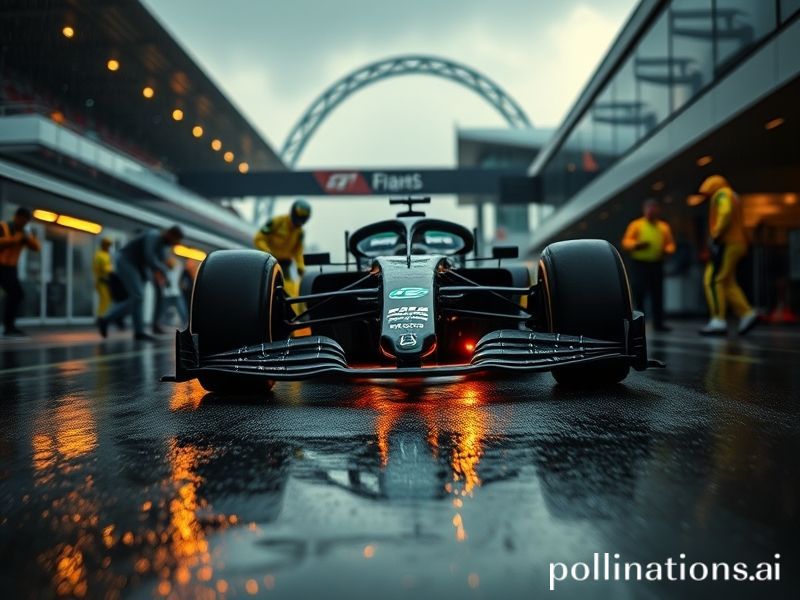Silverstone: The Global Circus Where Nations Rev Their Engines and Pretend It’s Diplomacy
Silverstone: The Last Colonial Outpost Where Engines Still Speak Louder Than People
By Our Man in the Paddock, nursing a lukewarm gin in a paper cup
Silverstone, Northamptonshire—population roughly that of a midsize Moldovan bus station—hosts, once a year, the planet’s most expensive traffic jam. Formula One decamps here like a marauding circus that forgot its manners, convinced that what the world truly needs is 20 carbon-fiber phalluses screaming past a former WWII bomber base at 320 kph while billionaires pray their yacht-berth reservations in Monaco haven’t been double-booked.
The circuit itself is a glorious anachronism: a few repurposed runways and awkwardly repurposed farmland that the British still insist on calling “the home of motor racing,” much the way an elderly relative insists on referring to the wireless telegraph as cutting-edge. Yet every July, Silverstone becomes the United Nations of Excess. Japanese executives clutching limited-edition champagne flutes queue behind Qatari royalty who’ve flown in on planes with seatbelts made of actual gold, all of them united by the touching belief that the louder the exhaust, the more profound the geopolitical insight.
Globally, the race is a Rorschach test. To the European Union, it’s a cautionary tale about fossil-fueled nostalgia—proof that, even in 2024, some bureaucracies would rather legislate internal combustion out of existence than ask why a Dutch teenager on TikTok now has more soft-power influence than the entire Commission. To the Americans, Silverstone is quaint: a place where people still queue politely instead of suing one another over hot-dog mustard ratios. To the Chinese delegation, it’s a pop-up showroom for next season’s EV dominance, disguised as a sporting event. They take notes on battery-cooling tech while politely ignoring the irony that the loudest noise in the British countryside is still coming from a Mercedes-AMG.
And what of the British themselves? They treat the weekend as an opportunity to display that uniquely imperial talent for combining self-deprecation with astronomical cost. A single grandstand ticket now costs roughly the annual GDP of Tuvalu, but the locals will assure you—between sips of rain-diluted ale—that it’s all frightfully good value, provided you bring your own sandwiches and an umbrella sturdy enough to double as riot gear. The Union Jack, once the flag of empire, flutters gamely above campsites littered with disposable vapes and crushed dreams of a post-Brexit trade surplus.
The broader significance? Silverstone endures as a monument to humanity’s refusal to learn anything, ever. Climate summits end in communiqués nobody reads, but swap a few spark plugs and suddenly the planet tunes in for two hours of high-octane denial. Each lap is a tiny, expensive prayer to the gods of combustion: please, just one more decade before we all have to pretend we enjoy the whirr of an electric motor. Meanwhile, the circuit’s carbon footprint is dutifully offset by planting trees somewhere far away—preferably on a continent without television rights.
Still, there is something almost touching about the ritual. In an age when wars are live-streamed and elections hacked by teenagers in basements, Silverstone offers the comforting illusion that physics still matters. Downforce, tire degradation, the precise angle at which a driver clips the apex at Copse—these are problems you can solve with money, yes, but also with ingenuity and courage, commodities currently in shorter supply than cobalt.
When the lights go out on Sunday and the private jets lift off like migrating geese with expense accounts, the farmland reverts to its natural state: soggy, slightly ashamed, and already preparing to do it all again next year. The engines fall silent, the champagne flutes are recycled into something suitably bourgeois, and the world returns to its usual programming of doomscrolling and debt restructuring.
But for a brief, deafening weekend, Silverstone reminds us that the most honest dialogue between nations still takes place at 18,000 rpm—provided you can afford the ticket, and the earplugs.







